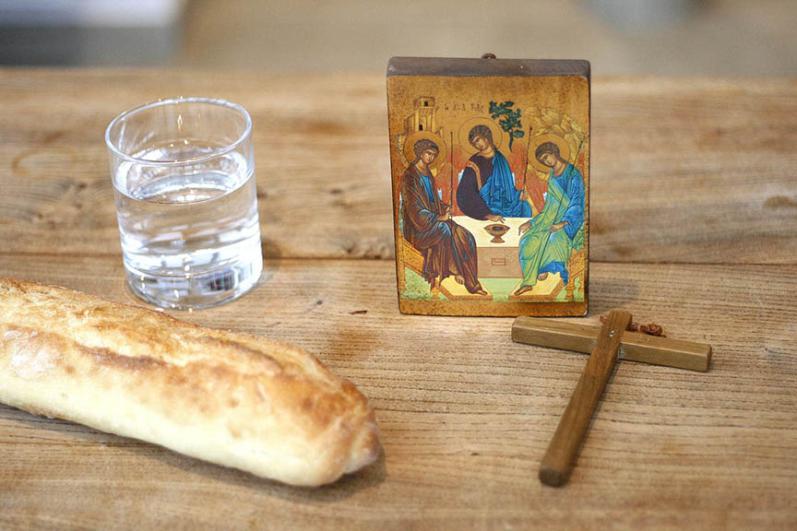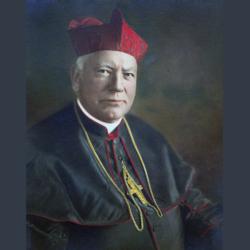Quinquagesima
The word I have chosen for the title of this essay means "fiftieth" in Latin. Before Vatican II, among Catholics, the term referred to the Sunday before Lent, which is exactly 50 days before Easter. This coming Sunday, Feb. 11, on the old calendar would have been Quinquagesima.
On the same pattern, in a typically Catholic way (meaning, there was an easy-going logic to it) the Sundays before that were called, respectively, Sexagesima ("sixtieth") and Septuagesima ("seventieth"), because these were the Sundays which fell within the 60- and 70-day periods preceding Easter.
If we were Catholics on the old calendar, then, we would have begun counting down to Easter a few weeks ago. This countdown to Easter was at the same time an anticipation of the season of Lent.
In some areas, Catholics would begin giving up some foods on Septuagesima, and still others on Sexagesima, adopting a full and rather austere discipline at the beginning of Lent. They might give up cheese on the one Sunday, and then eggs also on the next, and then at last meat with the onset of Lent (which is why celebrations just prior to Lent were called the Carnival, "say goodbye to meat," carne vale).
I marvel at how luxuries are relative to time and circumstance. In agrarian cultures familiar with cycles of abundant and lean years, of rich harvests and then famines, cheese and eggs were regarded as luxuries. Therefore, poor as these people were, they could, as entire societies, give them up. We in contrast, although enjoying astounding prosperity in comparison, would regard it as heroic -- and perhaps fanatical -- for even a single household to put these foods aside for the season of Lent. But without increasing austerities, what sense could this pre-Lenten season make?
The sequence Septuagesima-Sexagesima-Quinquagesima was eliminated in the intention of the Council Fathers of Vatican II, in lines with a general aim "to deepen through clarification," as one might put it. "The minds of the faithful must be directed primarily toward the feasts of the Lord whereby the mysteries of salvation are celebrated in the course of the year." ("Sacrosanctum Concilium," 108)
Baptism is jarring: it is a cold plunge. Repentance is and should be sharp: turn away from sin and embrace the Good News. "The season of Lent has a twofold character: primarily by recalling or preparing for baptism and by penance, it disposes the faithful, who more diligently hear the word of God and devote themselves to prayer, to celebrate the paschal mystery" (n. 109). It seems fair to say that the Council Fathers wanted the attention of Catholics to be focused less on disciplines related to food and more towards interior examination, the reading of the Scripture, and prayer.
Of course, these deeper movements of the soul and spiritual practices had always been available to Catholics, and some took that path. On the other hand, simplification if not followed by intensification becomes simply a negation, loss, and forgetfulness of our past.
Were the Council Fathers, then, wise or not in their intention to simplify? I do not regard myself as called upon to judge them. But was that intention well implemented? I note that the bishops of the Polish National Catholic Church apparently regarded the abolition of a preparatory period before Lent as some kind of a failure, because in 2014 they restored the Septuagesima sequence in their liturgical calendar.
I note, too, that it does seem to be a part of human nature, that we are assisted by countdowns. You may have noticed the "Countdown to the Super Bowl." The first instant of the New Year indeed comes as a sudden and clear discontinuity, and yet to lead up to it, we like to watch the ball drift slowly down the tower in Times Square.
Perhaps, because we cannot resist a countdown, when the countdown to Lent was abolished, we began to see Lent itself as simply some kind of countdown to the feasting of Eastertide.
On the other hand, who is responsible for implementing the intention of the Council Fathers, except you and me? We should prepare for Lent in advance: agreed. But what have we done about it? Priests: have you spoken with your flock about it on former Septuagesima? Fathers of families and mothers: have you had a "family council" by now, about how Lent is going to look in your household?
I had thought the Second Vatican Council was about lay initiative. This I know as a layperson: if I do not myself adopt a training program, I will not become fit. If I do not myself take active steps, I will not start a business or advance my career. If I need help in fitness, I can ask a friend or seek a personal trainer. If I need help in pursuing a Lenten discipline, I can do something similar.
I neither want nor need a bishop to come into my home and sit with me to make sure I pray and read the Bible during Lent. Therefore, why do I need a rule or norm? We know that all rules and norms can be gamed. Why are not teachings and guidance enough? Is that we do not love sufficiently -- or not yet?
I am tempted to say, here, too: The ideal of Vatican II has not been tried and found wanting. It has been found difficult; and left untried.
- Michael Pakaluk, an Aristotle scholar and Ordinarius of the Pontifical Academy of St. Thomas Aquinas, is a professor in the Busch School of Business at the Catholic University of America. He lives in Hyattsville, MD, with his wife Catherine, also a professor at the Busch School, and their eight children. His latest book is "Mary's Voice in the Gospel of John" available from Amazon.



















